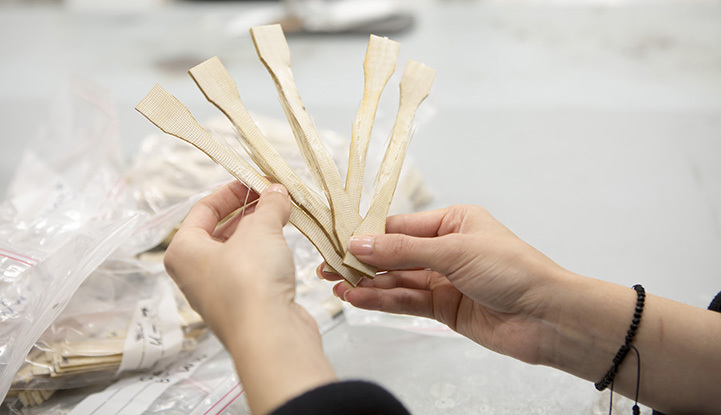Polymer Technology Lab
Polymers
Polymers are molecules that consist of infinitely many minor units--monomers--bound to each other by chemical bonds. The polymers are thus extremely large molecules, often also called macromolecules, and they can be characterised as long molecule chains, which may have shorter branches.
The unique molecular structure of the polymers allows them to be processed by heating, in different shapes, so that they can be elastic and soft, or brittle and hard.
Processing is done by extrusion and injection moulding, filing spinning, and compression moulding. With these methods, we can study how different bioplastics can be used in different products. The bioplastics are then characterised by mechanical strength, machinability, heat resistance and how well the materials can withstand a damp environment. An important part of the research is the development of composites (see Fact box) that are used in structural applications such as car components, building materials, furniture, sporting goods and boats.
The Polymer Technology Lab is used for research mainly focused on bio composites, which consist of natural fibres derived from plants and forests, and also of biobased resins or binders. We process the composites through compression moulding and vacuum injection, and characterise the composites for tensile, flexural and impact strength. By using natural fibres such as flax and hemp, better impact resistance can be achieved, which is important in automotive components, and the research work being done focuses heavily on developing new composite materials for future cars and vehicles.
Plastics
Plastics is the main field of use for polymeric materials. The plastics are very lightweight materials that can be machined to almost any shape, which can also be very complicated. Many plastics are transparent, and the properties of the plastics can be modified in infinitely many ways by the addition of other substances. Plastics in today's society are very important materials that we could not do without.
Plastic protects and preserves food, enables transport of the consumer products ordered via e-commerce, are used in healthcare in many different ways, and are also used in many technical and industrial products and processes where the unique properties of the plastics can be utilised.
In the textile field, research is ongoing on new functional polymeric fibres, for example smart textiles, technical textile products and textile implants. By mixing fibre-forming polymers with various active components, textile fibres with very special properties can be made, such as high fire resistance, electrical conductivity, or the ability to induce growth in different cells in a textile implant.
Research is being conducted with several research groups in other countries, e.g. Great Britain, India and Finland, and involve many guest researchers and students from other universities.
The Polymer Technology Lab is utilised by students of the programmes Chemical Engineering--Applied Biotechnology, Master's Degree Programme in Resource Recovery, Master's Degree in Textile Engineering, and PhD students in Resource Recovery and Textile Materials Engineering.
Did you know that...
... every year 300 million tonnes of plastic are produced and it takes about 1,000 years for oil-based plastics to break down. Bio based plastics break down in just a few years.
… most plastics eventually end up in landfills or the ocean. This can be prevented by recycling and reusing plastic.
… within the juice industry, 15 million tonnes of citrus waste will be produced annually. Researchers in Borås are developing methods for producing bio composites from waste from, among others, the company Brämhults Juice.
Fibres
Polymeric materials can also be processed into thin fibres, which are then used to make yarn and wire for textile products. A good example is the polyester fibres; they consist of a polyester resin that has been formed into very thin threads. Unfortunately, the use of plastic can have environmental consequences, such as littering and pollution of the oceans. Plastics today are also, to a large extent, made of non-renewable raw materials, and thus also have a small impact on the climate when burned. Research in the Polymer Lab is therefore largely about preventing these problems.
Resources in the Polymer Technology Lab
- Compounds
- Injection moulding
- Piston Casting Machine
- 3D printer
- Mechanical testing equipment
- Extruder
- Equipment for impact testing
- Moulding press – 10 tonnes
- Moulding press – 20 tonnes
- Equipment for RTM
- Pyrolysis oven
Resources in the Analysis Lab
The Analysis Lab is part of the Polymer Technology Lab. The materials studied in the Polymer Technology Lab are then tested in the Analysis Lab.
- Differential Scaling Calorimetry (DSC)
- Thermogravimetric Analyser (TGA)
- Dynamic-Mechanical Analyser (DMA)
- Stereo Microscope




